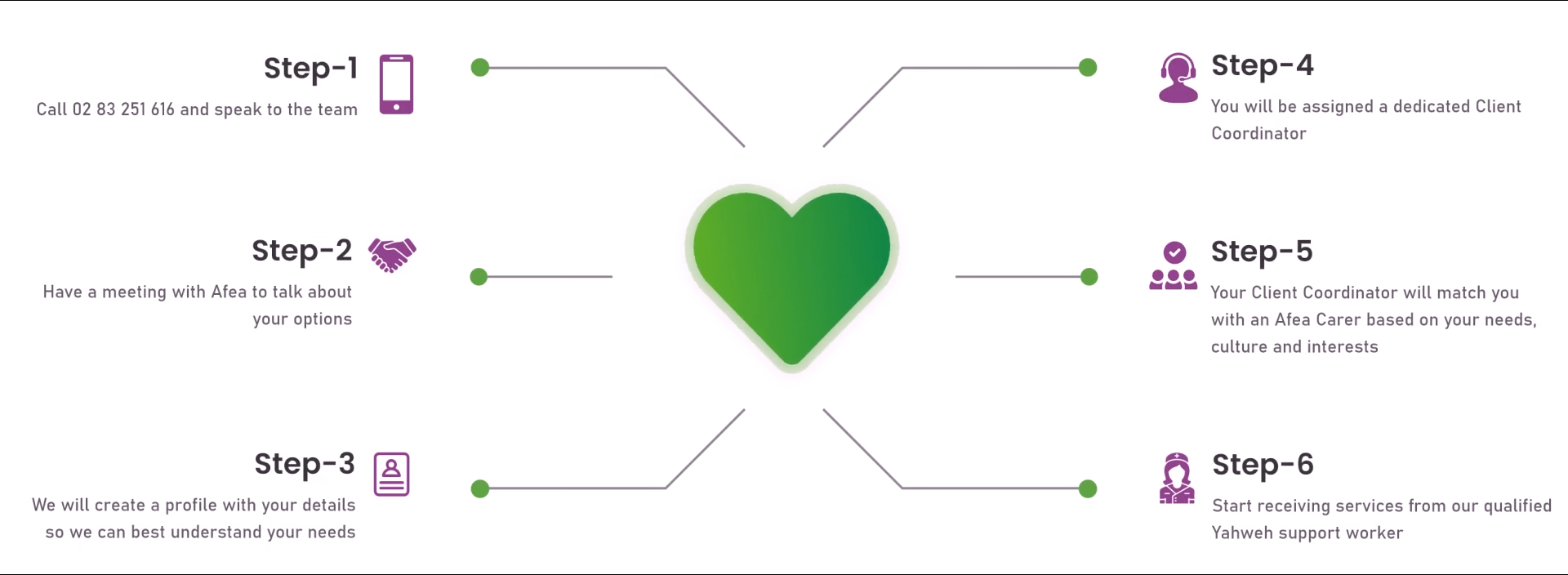SWITCH TO YAHWEH CARE
Providing care and holistic approach to NDIS participants aiming to create opportunities for you to live your best life.
Contact UsThe NDIS-funded Allied Health Services has a broad range of health services. If you’re eligible, these supports can make a big difference in your daily life. But it helps to know what’s available, how to access it, and how to make the most of your plan.
Allied health professionals aren’t doctors or nurses. They’re trained specialists who help you improve or maintain your physical, social, or mental function. Their services are based on your goals. These can be about independence, mobility, communication, or emotional wellbeing.

Here are some of the main allied health professionals work services you can get through your NDIS plan:
Occupational Therapy – Occupational Therapy helps you develop practical skills to live more independently and confidently. This can include learning to dress, cook, manage time, clean your home, or use assistive technology. The therapist also assess your environment and recommend changes to make everyday tasks safer and easier.
Physiotherapy – Physiotherapy focuses ton enhancing physical function and mobility. Physiotherapist assist you in improving your strength, movement, and coordination, especially if you have a disability that affects how you move or manage pain. Additionally, physiotherapists can design exercise programs to reduce the risk of health injury and help you stay active.
Speech Pathology – Speech Pathology helps with communication, including speaking, understanding language, and using social skills. It also supports people who have difficulty swallowing or managing saliva, which can impact eating and health. A speech pathologist tailors therapy to your needs, whether it’s learning to speak more clearly or using communication devices.
Psychology – Psychology supports your mental health, emotional wellbeing, and behaviour. A psychologist can help you manage anxiety, depression, or behavioural challenges, and develop coping strategies for daily life. They also work with you to build confidence, improve relationships, and reach your personal goals.
Exercise Physiology – Exercise Physiology uses tailored physical activity as treatment to improve strength, fitness, and overall health. It’s especially helpful for managing chronic conditions, physical disabilities, or recovery from injury. An exercise physiologist designs safe, goal-based programs that support mobility, independence, and daily function.
Dietitian Services – Dietitian help you manage your nutrition and dietary needs based on your health conditions or lifestyle. The professional ensures you get the right nutrients to support your growth, energy, and overall health. Part of their task include creating meal plans, addressing feeding difficulties, or managing allergies and intolerances.
Podiatry – Podiatry focuses on the health of your feet, ankles, and lower limbs, which is vital for mobility and balance. A podiatrist can treat issues like foot pain, deformities, skin conditions, or problems caused by conditions like diabetes or cerebral palsy. They also recommend orthotics, footwear, or mobility aids to improve walking comfort and safety.
Social Work – They provide specialised support for emotional assistance to help you manage life’s challenges and connect with services. A social worker can assist with things like family relationships, housing, advocacy, and accessing community health centres and supports. They also help you navigate complex situations and build skills to cope with stress, change, or crisis.
NDIS services are tied to your goals. You need to show how each support helps you work towards them. For example:

Not all allied health services and healthcare are equal. Some providers have more experience with disability-specific needs. Others may specialise in children, adults, or certain diagnoses.
Check the Provider’s NDIS Registration for the national professional organisation. Registered providers meet certain quality standards, and checking a provider’s NDIS registration ensures they meet the national standards set by the relevant national accreditation body, such as the NDIS Quality and Safeguards Commission.
Ask About Experience – A good therapist asks the patients the right questions, listens carefully, and adjusts their approach based on your specific challenges and what you want to achieve. Therefore, make sure the therapist understands your illness and goals to ensures they can tailor strategies and interventions that actually support your goals.
Set Clear Goals – At your first appointment, agree on what success looks like. This helps you and your therapist stay focused, track progress, and adjust the plan if needed. Clear goals also make it easier to justify ongoing funding during your NDIS review.
Request Progress Reports – Progress reports show how therapy is helping you work toward your goals. They provide written evidence of improvements, challenges, and recommendations for future support. These reports are essential during NDIS plan reviews to help secure continued or increased funding.
Use Your Plan Flexibly – Flexibility also allows you to shift funds between support categories (where permitted) to focus on what’s most important to you. Using your plan flexibly means making the most of your funding by choosing services and providers that best suit your needs.
You don’t always need a doctor’s referral, but having reports explaining your needs helps. If you’re new to therapy, your NDIS planner or Support Coordinator can help you choose where to start.
Before you book sessions, you’ll need:
This is especially important for children or participants with multiple diagnoses. A team approach saves time and gives better results. Thus, you might see more than one therapist if you have complex needs. It’s important they work together. That means:
Assessments are often the first step. They help set goals and measure change over time. The NDIS usually funds these, but you need to check your plan. These reports are also vital for plan reviews and applying for more funding.
Some common assessments include:
Make sure your therapists know when your review is due because their input is critical. To keep allied health services in your next plan:

Allied health services can transform your everyday life. The NDIS is there to help you live with more independence, confidence, and choice. But to get the right support takes planning, good communication, and knowing your options.
Take charge of your plan, ask questions, and speak up about what’s working and what isn’t. You deserve support that’s tailored to your needs, not just what’s available.
If you want to know more about this allied support, contact Yahweh Care for assistance.
Providing care and holistic approach to NDIS participants aiming to create opportunities for you to live your best life.
Contact Us


